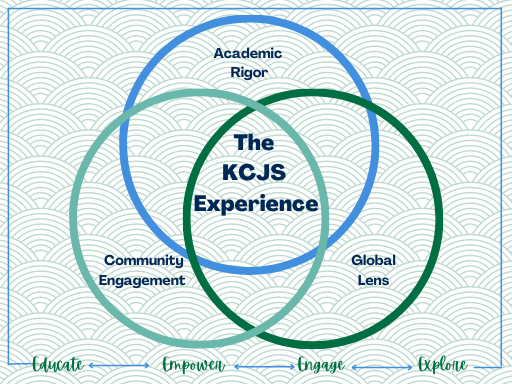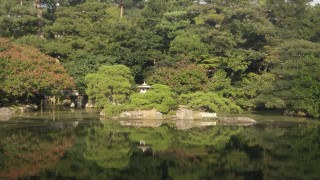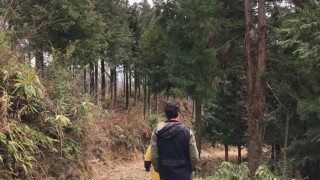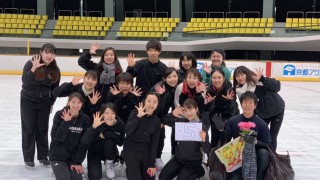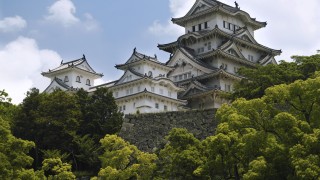Spend a semester or academic year developing your Japanese language skills and studies in Kyoto, a dynamic city rich in history and the arts with an energetic culture that fosters collaboration and innovation. Connect with locals through Japanese university campus life and community engagement opportunities while studying alongside a diverse group of undergraduates from top U.S. and Japanese institutions.
About
The Kyoto Consortium for Japanese Studies (KCJS) draws on its 30+ year history and reputation providing undergraduate students with a semester, academic year-long and summer offerings.
History
KCJS began as the Kyoto Center for Japanese Studies in the fall of 1989 as a consortium of nine American universities. It changed its name to the Kyoto Consortium for Japanese Studies in 2006 and now consists of 13 member institutions. KCJS is administered jointly by Columbia University’s Center for Undergraduate Global Engagement and a full-time staff based in Kyoto.
The KCJS offices and classrooms are located on the Doshisha University’s Imadegawa campus where students can engage socially and academically with local Japanese students and student life. For campus map, please click here. You can also visit the KCJS website for more information.
The KCJS Experience: Our approach to engaging students in Japanese language and culture has always been to provide a rigorous academic curriculum while providing ample opportunity for students to apply their learning in the community. Students who have studied with KCJS have benefitted from an integrated approach to learning that ensures they improve their language skills, their knowledge of Japan and themselves within the larger global context.
Consortium Members
Members of the consortium include:
Boston University, Brown University, University of Chicago, Columbia University/Barnard College, Cornell University, Emory University, Harvard University, University of Pennsylvania, Princeton University, Stanford University, Tufts University, Washington University in St. Louis, and Yale University in association with the University of Virginia.
The KCJS welcomes applications from outside of the consortium.
Host School
KCJS is located on the Imadegawa campus of Doshisha University (DU) allowing students to be a part of a Japanese university campus community and involve themselves in college student life. KCJS students join DU clubs and student groups, hang out in student hubs, and participate in various aspects of Japanese college culture. Doshisha University has a large, Western style university campus founded in 1875 by Niijima Jō (a.k.a., Joseph Hardy Neesima) who was educated in the United States. As such, many KCJS students feel at home on the beautiful campus. KCJS classrooms and administrative offices are located in the center of campus near the library, computer labs, cafeteria, and other facilities college students rely on.
KCJS provides many activities to involve students in campus life as well as the broader Kyoto and Doshisha community. Learn more about extracurricular activities here.
Location
Japan’s ancient capital for over a millennium (794-1868), Kyoto is steeped in history with 17 UNESCO World Heritage Sites, while also being a place where the arts and technological innovation converge to create a dynamic, contemporary culture. As chic as Paris or Milan, Kyoto isn’t simply a civic museum of its past glory. While you will find shops that have been in business for over a thousand years, at the same time Kyoto merchants and artisans are creating the most avant-garde trends in art, architecture, fashion, and cuisine. As a global city, Kyoto also has communities of concerned activists addressing global issues such as climate change, animal rights, gender, poverty, and refugee rights.
Academics
The KCJS Experience is rooted in our academic program. We educate and empower students and help them engage and explore all facets of Japan. Each semester students take a total of 16 points/credits which includes 8 points in language classes and 8 points in disciplinary classes. Through these courses you are introduced to various avenues to get involved in the local Kyoto and university communities and build relationships with Japanese in everyday settings. Additionally, you are exposed to local artisans, professionals, and practitioners to help you better understand historical and contemporary Japan from various perspectives. And, if you have a specific interest you wish to pursue, whether academic or personal, the KCJS team will help to connect you with the appropriate resources.
[A] Japanese Language Course (total of 8 points/credits)
Your KCJS intensive language class will challenge you in speaking, reading, writing and reading Japanese five days a week for two hours each day. We offer a variety of Japanese levels with small class sizes and tailored instruction so you get the most from your studies. You will use what you are learning and find your language skills improving from day one!
For more information please see the Japanese Language Program on the KCJS website.
[B] Disciplinary Courses (total of 4 points/credits)
You will take two disciplinary courses, taught in either English or Japanese, as a complement to your Japanese language studies. These disciplinary courses offer you the opportunity to learn not only about Japan’s history, arts and culture, but also about various academic disciplines. Many of these courses incorporate experiential learning, such as field trips and in-class demonstrations and include the following:
KCJS Courses: specially-developed courses, taught exclusively for the program by instructors that use the city of Kyoto, its past and present, to showcase the humanities, social sciences, and the sciences and pressing global topics.
Project/Theme based Japanese: designed for students who want to improve their Japanese in a specific area or field of study, based upon a project of their design.
Independent Study: offered as an option for motivated students who want to explore a specific research topic in-depth, and acquire the methodological and analytical skills necessary for academic research.
Associated Kyoto Program (AKP) courses: a limited number of AKP courses are offered for KCJS students who require specific credits as part of their degree program.
For more information please see the Disciplinary Courses section of the KCJS website.
KCJS reserves the right to withdraw or modify the courses of instruction or to change the instructors as may become necessary.
Grades and Transcripts
Language Placement Policy
You should consult with your home school's study abroad office and/or Japanese Language Department about the type of credit you will be awarded upon completing KCJS. You should also find out if you will need to take a language placement exam when you return to campus if you want to continue studying Japanese.
Grade Policy
Click here for the Columbia Semester/Academic Year program grading policies.
Transcripts
1. All KCJS students should request a non-degree transcript through Columbia University's registrar, with the exception of Columbia University students. Depending on your home school policy, you should have the transcript sent to your home school study abroad office, or registrar.
2. Before May 2024, if you were an undergraduate from the following: Boston University, Brown University, University of Chicago, Columbia University/Barnard College, Cornell University, Emory University, Tufts University, University of Michigan (before Spring 2017), University of Pennsylvania, Stanford University, and Washington University in St. Louis:
Grades for courses taken at KCJS are reported on a document called a KCJS Grade Report, which is not an official transcript. Where the Grade Reports are sent and how they are processed depends on your home school and the year you attended KCJS. KCJS Grade Reports were sent to your home school Study Abroad office and forwarded to your home school registrar for incorporation into your home school transcript. Each school decided how to include the KCJS courses. Some schools report course titles and grades while others may report only titles with credit or only transfer units.
If your KCJS grades do not appear on your home school transcript and you are applying to a program or school that requires these grades, you will need to request a copy of your KCJS Grade Report. Please send a request for a grade report to uge@columbia.edu. Please include in your email your full name, term and year of participation, and home school.
3. After July 2006, if you were an undergraduate from Harvard University, Princeton University, the University of Virginia, Yale University, or any non-consortium member school:
Your KCJS grades are posted on a Columbia University transcript. Transcripts can be requested from the Registrar's Office.
4. Prior to July 2006, if you were an undergraduate student from Harvard University, Princeton University, the University of Virginia, or any non-consortium member school, or as a recent graduate of any school:
You were enrolled as non-matriculated students at Stanford University and can request a Stanford transcript for your KCJS work. There is no charge for Stanford transcripts. Instructions can be found on Stanford's Office of the Registrar website. Follow the instructions for Alumni enrolled previous to 5 years ago, regardless of when you attended KCJS.
Eligibility and Application
- Must be a currently enrolled undergraduate student in good academic and disciplinary standing
- Must have completed at least one year of college-level Japanese for the fall semester, and three semesters for the spring semester, or the equivalent
- All students must be placed into an appropriate language course (2nd, 3rd or 4th Year Japanese). Students who are fluent in Japanese, or above the 4th year level, are not eligible to study at KCJS.
- Minimum 3.0 average language GPA
- Minimum 3.0 cumulative GPA. Students must also maintain a 3.0 GPA during the semester before going abroad.
- Students may be required to complete a study abroad application at their home school, in addition to the official KCJS application on this site.
How to apply
Want to apply? Click the “Start Your Application" button at the top of this page. If the button doesn't appear above, the program is not yet accepting applications. You will be asked to set up a short profile, which will allow us to send you relevant information about your application. Once you’ve created a profile, you will see a checklist of items that you will need to submit. These generally include:
- Application questionnaire(s)
- Personal statement
- Letter of recommendation from someone who has recently taught you Japanese
- Letter of recommendation from someone who has taught you at the university level who can attest to your academic skills
- Official transcript(s)
- Home school approval/clearance: please check with your home university's study abroad office about applying for permission to attend the program and to transfer the credit
Financial Considerations
Program Costs
Many students use a combination of federal student aid and home school grants to fund their undergraduate studies. Many, if not most, of these funds are applicable to studying abroad for a semester or academic year. The costs of studying abroad during the semester or academic year are frequently comparable to those of staying on campus.
All students should work with their home school financial aid office to determine what aid is available for studying abroad.
Please see below for the cost breakdowns for detailed information on all program-related expenses:
Fall 2025:
- Cost Breakdown for Columbia Students
- Cost Breakdown for Barnard Students
- Cost Breakdown for Consortium Students from Harvard, Princeton, UVA, and Yale
- Cost Breakdown for Consortium Students from BU, Brown, Chicago, Cornell, Emory, UPenn, Tufts, Stanford, and Washington University in St. Louis
- Cost Breakdown for Visiting Students
Spring 2026:
- Cost Breakdown for Columbia Students
- Cost Breakdown for Barnard Students
- Cost Breakdown for Consortium Students from Harvard, Princeton, UVA, and Yale
- Cost Breakdown for Consortium Students from BU, Brown, Chicago, Cornell, Emory, Tufts, UPenn, Stanford, and Washington University in St. Louis
- Cost Breakdown for Visiting Student
*Please Note: Tuition and fees are subject to Board of Trustee approval and may change*
WITHDRAWAL & REFUND POLICY
If you decide to withdraw from the program after confirming your participation, please be aware of the financial consequences and the office policies by reviewing the Withdrawal and Refund Policy here.
FINANCING YOUR STUDIES IN JAPAN
Eligible students may apply for the following scholarships applicable to this program:
Bridging Project Scholarships
KCJS students may also use Bridging Project Scholarships to attend KCJS. The Association of Teachers of Japanese Bridging Project at the University of Colorado at Boulder awards up to 30 scholarships to assist students with the travel and living expenses they will incur while studying abroad in Japan. For information on how to apply, eligibility regulations and deadlines, please check their website.
Freeman Awards for Study in Asia
Created to assist U.S. undergraduate students (U.S. citizens or permanent residents only) with demonstrated financial need and limited prior experience in East and Southeast Asia, Freeman-ASIA will fund awards ranging from $5,000 per semester to a maximum of $7,000 for a full year abroad. Prospective students should visit the Freeman-ASIA website for eligibility requirements, full application instructions and a list of deadlines.
Toshizo Watanabe Study Abroad Scholarship
This scholarship provides financial assistance to students pursuing study abroad in Japan. The scholarship will support the cost of attendance to the institution or study abroad program of the applicant’s choice and grants awards to recipients in amounts determined by financial need and other qualifications. Priority is given given to students who identify as the following: undergraduates, first-generation students, applicants without international experience and applicants who have been raised by a single parent/or as an orphan.
For more information and resources on financing your time abroad, please see the pages below:
The KCJS Experience
Our approach to engaging students in Japanese language and culture has always been to provide a rigorous academic curriculum while providing ample opportunity for students to apply their learning in the community. Students who have studied with KCJS have benefitted from an integrated approach to learning that ensures they improve their language skills, their knowledge of Japan and themselves within the larger global context.
AcadeMIC rIGOR
Community engagement
Our commitment to offering students community engagement opportunities as a key part of the KCJS Experience ensures you immerse yourself in the local and university communities, engaging and learning beyond the classroom. Put your studies to use as you join university student clubs, take lessons in a traditional art, volunteer with a local organization, experience living amongst Japanese students, and many other options.
Community Involvement Project
The Community Involvement Project (CIP) obliges you to actively use Japanese outside of the classroom and in real-life settings. As part of your language course, you will be asked to reflect on your CIP experience as a way to understand yourself and the Japanese cultural lens. It also empowers you to engage with diverse groups and local people, pursue your own interests, and explore future possibilities for your career path.
Learn more about the CIP here.
Living in the community
As a key component of the KCJS Experience, students live amongst local residents of Kyoto in a homestay placement, in a student dormitory, or independently in an apartment. Students soon learn that Kyoto is a very livable city that is comfortable to navigate, whether by learning the bus or subway lines or exploring on foot or bike. Live like a local as you build routines and immerse yourself in your new surroundings and daily Japanese life. You’ll come to know Kyoto as an easily livable and navigable city!
Learn more about the housing options here.
Connecting with Doshisha University and other university students
KCJS is centrally located in Kyoto on the Imadegawa campus of Doshisha University (同志社大学). As part of campus life, you will eat in the university cafeterias, study in the library, spend time in the student hub, and join student clubs and activities. KCJS also maintains a longstanding relationship with Kyoto University and KCJS students may also take classes at Kyodai as well as at Doshisha. The KCJS Experience allows our students to connect in and out of the classroom with Japanese students as mentors and guides to practice their language skills, get to know the Japanese university community, and build their social network.
Community Engagement activities have included learning from a Zen priest how to practice Zazen, joining the KCJS Japanese conversation partner program, witnessing kimonos being woven by artisans, volunteering to share language and culture to elementary school students, developing cooking skills in a Japanese cooking class, participating in KCJS alumni talks and networking.
Student Clubs and Community Circles students have joined in the past include Orchestra Ensemble Kyoto, Doshisha Student Television Network, Kyoto University Chorus, Doshisha Hiking Club, Kyoto University Amateur Dance Club, Acro Yoga, Tennis Club, Kyoto University Karate Club, lessons in Iaido (sword-drawing performance), shamisen, koto, tea ceremony, and calligraphy.
Learn more about connecting with Japanese classmates through extracurricular activities here.
A GLOBAL LENS
The KCJS Experience encourages students to use a global lens in understanding the whole of their experience in Japan - you will find yourself beginning to connect your readings and classroom discussions with your observations and encounters in your daily life. As you reflect on these experiences, you will begin to understand yourself and Japan in the larger global context.
[A] Diversity of Japanese perspectives
You will learn from local experts in their fields, go on field trips and site visits, and participate in in-class demonstrations with the goal of seeing the intersections of historical and contemporary Japan. In and out of the classroom you will come into contact with different approaches, beliefs, and cultural values which will offer you the chance to reflect upon your own worldview.
[B] Expanding self awareness and perspective taking
KCJS instructors encourage you to delve deeper in considering the many facets and nuances of Japan, past and present, by tapping into a variety of Japanese perspectives and approaches to addressing life. Your instructors guide you as you learn and use Japanese, helping you understand misinterpretations and cultural missteps. You will be challenged to consider your own outlook and values as you experience those of the Japanese you get to know.
[C] Understanding the global context
Throughout your KCJS experience you will have meaningful opportunities to analyze and explore global challenges from within the Japanese context, engage with a diversity of people who call Kyoto home, and begin to develop an integrated understanding about how local actions in Japan can impact the larger world.
Find Out More
Speak to an Adviser: Want to learn more? Make an appointment to talk with Karyn Comeau , the adviser for this program. You can also email her with any questions, or to arrange a meeting if you are unable to make the listed times.
Learn more about KCJS: visit the KCJS website to watch student videos, hear about student experiences, and learn about their faculty and staff.
Listen to an Information Session: Staff from the Center for Undergraduate Global Engagement give an overview of the KCJS Fall, Spring, Academic Year and Summer Programs.
Resources: View our Steps to Study Abroad page to see advice on Where to Begin, how to Prepare to Go, and what you need to know when Returning from Abroad. We will share many resources with you throughout the application and pre-departure process for preparing to study abroad.
We recommend reviewing the following before you apply:
Having a valid passport is one of the key components of going abroad. See more on our Passports and Visas page.
Need help deciding which semester, program, and experience are right for you? Check out our Choosing a Study Abroad Program page.
Learn about finances and study abroad on our Financial Considerations page.
If considering summer study abroad, review guidance on our Summer Study Abroad page.
Plan ahead and prepare for your health, well-being, and accessibility abroad by reviewing our Well-Being Abroad resources and Identity and Diversity Abroad page.
Once accepted, make sure to review the Prepare to Go page for more resources and information about preparing for your experience abroad.
